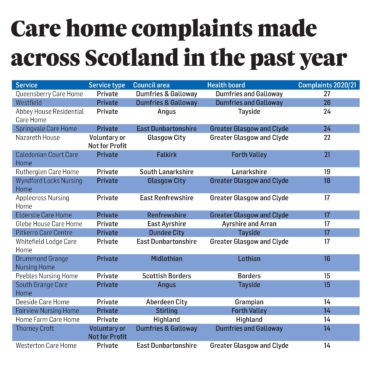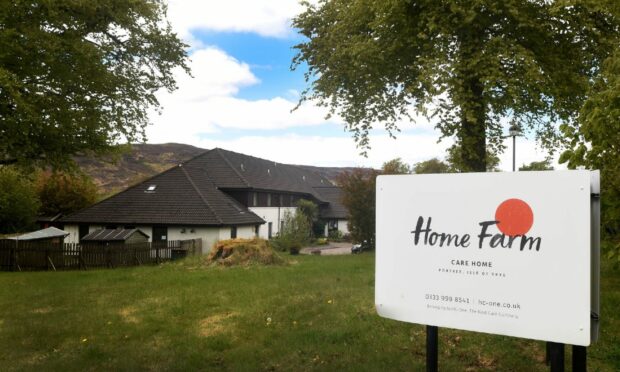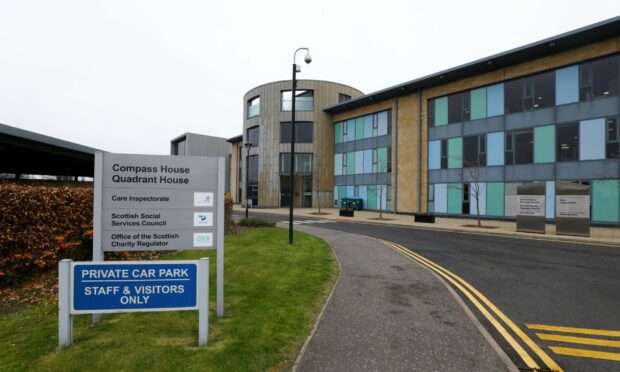Regulators only investigated 5% of complaints about care homes for older people as Covid-19 was leaving a trail of tragedy across Scotland last year.
Shock data shows a huge drop in the number of probes carried out by the Care Inspectorate into concerns raised by relatives of residents, as well as carers and staff.
It has been confirmed that just 122 of the 2,316 complaints made to the regulator about facilities for older people were fully investigated in 2020/21, down from more than 600 in previous years.
The finding has emerged as part of work on a special media collaboration project involving The Press and Journal, The Courier, The Scotsman, The Herald and STV.
The Care Inspectorate said the way it worked had to be “rapidly adapted” last year, including limiting on-site investigations in order to avoid spreading the virus.
However, Highland councillor John Gordon, whose father John Angus Gordon died with Covid-19 at Home Farm in Portree, called for an inquiry into the way they Care Inspectorate had been overseeing the sector during the pandemic.
He said: “I think that a lot of the problems that care homes are facing and what we have experienced during the pandemic in terms of some of the reports that have come out and the complaints that we’re now hearing about, ultimately is at the door of the Care Inspectorate.
“It’s part of the Scottish Government and they did not step up to the mark, so questions have to be asked of the Care Inspectorate because I do not think they did what they should have been doing.”
More than 3,300 deaths in Scottish care homes have been linked to Covid-19 during the pandemic, and failings in the system will be a key focus of a future public inquiry.
Media collaboration
Data on complaints has emerged as part of work involving several media organisations.
It follows our successful battle in May to force the National Records of Scotland (NRS) to publish coronavirus death figures for every care home across the nation, after a bid to keep the data secret was overruled by the Scottish Information Commissioner.
Under freedom of information laws, the Care Inspectorate has now also released figures to us which show the number of complaints lodged about individual care homes for older people in Scotland.

It has emerged that, amid efforts to cut the number of visits to facilities during the pandemic, a new triage system for complaints was introduced by the Care Inspectorate involving “more dialogue and mediation” at earlier stages.
In the process, the number of completed investigations fell dramatically from an average of 52 per month in 2019/20 to 10 per month last year.
Instead of investigations, more than half of complaints last year were noted for “intelligence” purposes and future inspection work, almost double the rate in the previous year.
The number dealt with by “direct service action” – where the regulator contacts the provider and asks it to engage with the complainer – also doubled, going from an average of 13 per month to 27.
‘Keen to learn lessons’
In a report to its board meeting in June, the Care Inspectorate said it was “keen to learn the lessons from our work on complaints in the last year” and had “commissioned an internal review of our complaints function”.
Data released by the regulator under FOI laws shows that there has been a total of 10,481 complaints about care homes for older people in the last five years.
The highest monthly figure, of 295 complaints, was recorded in April last year as the pandemic was spreading rapidly.
Care home complaints
Three-quarters of Scotland’s 806 care homes for older people were complained about last year, a higher number than in the previous four years.
The total number of complaints fell slightly from 2,352 in 2019/20 to 2,316 last year, with the change thought to be linked to fewer visits to residents from family and friends.
Half of all complaints received by the Care Inspectorate last year were about care homes for older people, the highest proportion in five years.
Of the 20 facilities with the most complaints last year, 18 were privately run.
Those included the Queensberry and Westfield homes in Dumfries and Galloway, which were the subject of 27 and 26 complaints, respectively.
The next highest number last year was for Abbey House at Kirriemuir in Angus, and Springvale in East Dunbartonshire, which both received 24.
Others north of the central belt included 17 complaints about Pitkerro in Dundee, 15 about South Grange at Monifieth in Angus, and 14 about both Deeside in Aberdeen and Home Farm in Portree.
Care inspectorate Scotland
Home Farm, where 10 residents died of coronavirus, has since been taken over by NHS Highland.
The Care Inspectorate said that it received at least one complaint about 82% of private sector care homes for older people last year, and upheld a complaint about 12% of them
Just under 40% of all complaints received in 2020/21 about care homes for older people were from relatives and carers, and more than a quarter were from staff members.
Healthcare was raised most frequently, accounting for 38% of upheld complaints, and included issues related to medication, continence care, tissue viability, nutrition, hydration and inadequate care and treatment.
Communication problems were raised in 17.8% of upheld complaints, followed by “wellbeing” in 8.3%.
A spokesman for the Care Inspectorate said: “In March 2020, in line with guidance from Directors of Public Health and after consultation with the Scottish Government, we rapidly adapted the way we worked because it was critical to minimise the spread of the virus, to keep people safe.
“Part of this meant on-site complaint investigations had to be limited to those that were deemed essential following an enhanced risk assessment.
“At that time we also significantly increased our contact with services and made use of technology where appropriate.
“The pandemic caused changes to how services operated. Some closed, and others restricted non-essential visitors.
“As a result, the trends and patterns in complaints noted in previous years were disrupted with falls in complaints received in the past year.”
In March 2020, in line with guidance from Directors of Public Health and after consultation with the Scottish Government, we rapidly adapted the way we worked because it was critical to minimise the spread of the virus, to keep people safe.”
He added: “The Care Inspectorate continually reviews our learning and experience across all our work to improve how we support care services.
“Complaint investigation is one important part of our scrutiny work. Complaints inform our wider work which includes intelligence gathering about care services and subsequently unannounced inspections of care services as required.
“Where we have serious concerns about a care service we do not hesitate to take action to keep people safe, and we lay a summary report of all our inspections every two weeks before the Scottish Parliament.
“Anyone with a concern about a care service is encouraged to raise it with their care provider in the first instance, but where this is not appropriate anyone can contact us about a concern on 0345 600 9527.”
Kevin Stewart, the Scottish Government minister for mental wellbeing and social care, said: “The safety, protection and wellbeing of residents and staff in care homes is a priority, and we have met regularly with the Care Inspectorate throughout the pandemic as they adapted to the challenges of inspecting and supporting care homes.
“Complaint investigations have continued throughout the pandemic as part of a multi-agency approach which also involves Health and Social Care Partnerships and local public health teams.
“We mourn every death from Covid-19 and express our sympathy for all those who have lost loved ones.
“We have confirmed there will be a public inquiry into all aspects of the impact and handling of Covid-19, including care homes, and our immediate focus is on continuing to do everything necessary to save lives for the remainder of this pandemic.
“In addition, the first minister announced an independent review into how adult social care can be most effectively reformed to deliver a national approach to care and support services.”
Karen Hedge, national director at Scottish Care, said: “The delivery of safe high quality care and support is our first priority.
“Whilst we understand the need to reduce footfall as a result of the pandemic, the sector is now in a safer position with the introduction of double vaccinations and other IPC measures.
The delivery of safe high quality care and support is our first priority.”
“In situations where a local resolution cannot be found, we would welcome Care Inspectorate intervention as a way to investigate and respond to complaints.
“This is a necessary part of the improvement process offering assurance to those accessing care and support and their families as well as to care providers and staff.”



